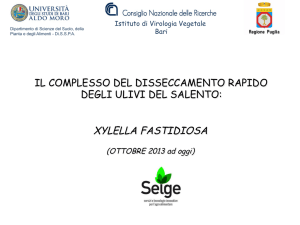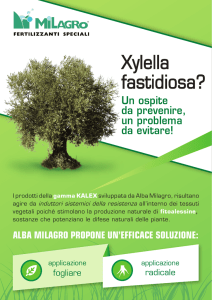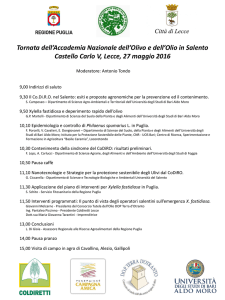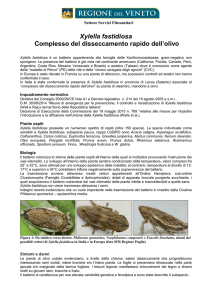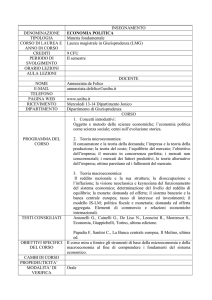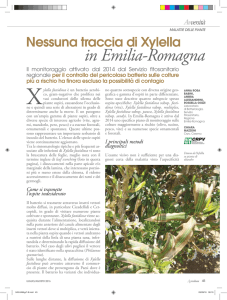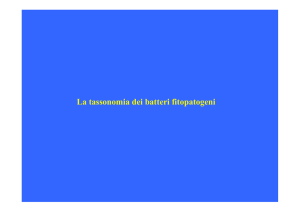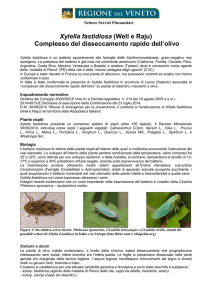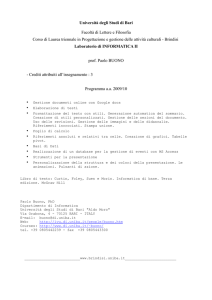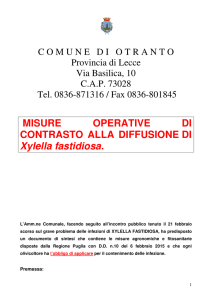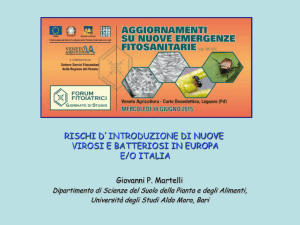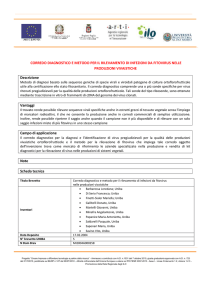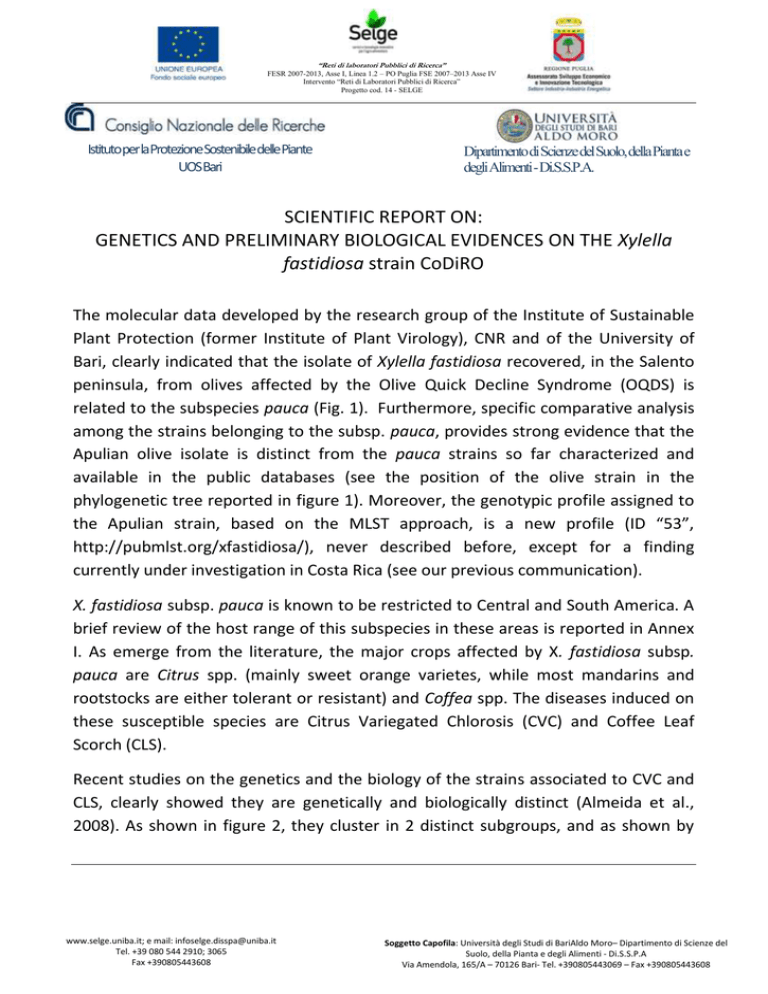
“Reti di laboratori Pubblici di Ricerca”
FESR 2007-2013, Asse I, Linea 1.2 – PO Puglia FSE 2007–2013 Asse IV
Intervento “Reti di Laboratori Pubblici di Ricerca”
Progetto cod. 14 - SELGE
IstitutoperlaProtezioneSostenibiledellePiante
UOSBari
Dipartimento di Scienze del Suolo, della Pianta e
degli Alimenti - Di.S.S.P.A.
SCIENTIFIC REPORT ON:
GENETICS AND PRELIMINARY BIOLOGICAL EVIDENCES ON THE Xylella
fastidiosa strain CoDiRO
The molecular data developed by the research group of the Institute of Sustainable
Plant Protection (former Institute of Plant Virology), CNR and of the University of
Bari, clearly indicated that the isolate of Xylella fastidiosa recovered, in the Salento
peninsula, from olives affected by the Olive Quick Decline Syndrome (OQDS) is
related to the subspecies pauca (Fig. 1). Furthermore, specific comparative analysis
among the strains belonging to the subsp. pauca, provides strong evidence that the
Apulian olive isolate is distinct from the pauca strains so far characterized and
available in the public databases (see the position of the olive strain in the
phylogenetic tree reported in figure 1). Moreover, the genotypic profile assigned to
the Apulian strain, based on the MLST approach, is a new profile (ID “53”,
http://pubmlst.org/xfastidiosa/), never described before, except for a finding
currently under investigation in Costa Rica (see our previous communication).
X. fastidiosa subsp. pauca is known to be restricted to Central and South America. A
brief review of the host range of this subspecies in these areas is reported in Annex
I. As emerge from the literature, the major crops affected by X. fastidiosa subsp.
pauca are Citrus spp. (mainly sweet orange varietes, while most mandarins and
rootstocks are either tolerant or resistant) and Coffea spp. The diseases induced on
these susceptible species are Citrus Variegated Chlorosis (CVC) and Coffee Leaf
Scorch (CLS).
Recent studies on the genetics and the biology of the strains associated to CVC and
CLS, clearly showed they are genetically and biologically distinct (Almeida et al.,
2008). As shown in figure 2, they cluster in 2 distinct subgroups, and as shown by
www.selge.uniba.it; e mail: [email protected]
Tel. +39 080 544 2910; 3065
Fax +390805443608
Soggetto Capofila: Università degli Studi di BariAldo Moro– Dipartimento di Scienze del
Suolo, della Pianta e degli Alimenti - Di.S.S.P.A
Via Amendola, 165/A – 70126 Bari- Tel. +390805443069 – Fax +390805443608
“Reti di laboratori Pubblici di Ricerca”
FESR 2007-2013, Asse I, Linea 1.2 – PO Puglia FSE 2007–2013 Asse IV
Intervento “Reti di Laboratori Pubblici di Ricerca”
Progetto cod. 14 - SELGE
IstitutoperlaProtezioneSostenibiledellePiante
UOSBari
Dipartimento di Scienze del Suolo, della Pianta e
degli Alimenti - Di.S.S.P.A.
experimental cross-inoculation the strains associated to coffee LS are not able to
infect citrus plants and viceversa (Almeida et al., 2008).
The surveys and the investigations carried out in the contaminated area of Apulia,
allowed to determine that olive, oleander, almond and vinca sp. are susceptible
hosts under natural field infections. An in depth survey was done to test the
presence of the bacterial infections in mature grapevines and adult citrus trees
grown in the heavily contaminated area. Both group of hosts were found always
free from infections (tested negative in diagnostic assays) as well free from any
symptom resembling those associated to Pierce’s disease and CVC (Fig. 3),
respectively (see our previous communications).
In conclusion, based on the sequences of 7 housekeeping genes analysed by
using the MLST approach, widely recognized as the most efficient typing method for
bacteria, the Apulian isolate can be related to the subspecies pauca. Its
distinctiveness from the known pauca strains, strongly supports that it represents a
novel strain, for which the name Xylella fastidiosa strain CoDiRO has been proposed.
Citrus spp. are amongst the principal hosts for X. fastidiosa subsp. pauca in south
America. Our biological data, even if not yet supported by the pathogenicity tests,
show that under natural infection conditions, the strain CoDiRO is not able to infect
citrus. This evidence is not something unexpected if we consider the high hostspecificity within the pauca subspecies. As mentioned before, the coffee LS strains
although genetically close related to the citrus CVC strains, even closer than the
CoDiRO strain (Fig.2), fail to infect citrus and viceversa. Accordingly, it could be
expected that experimental inoculations of the CoDiRO strain on citrus plants will
result in the failure to reproduce successful infections, confirming the evidences so
far recovered from the field surveys.
ALMEIDA R. P. P., NASCIMENTO F. E., CHAU J., PRADO S.S., TSAI C.W., LOPES S.A., J.R.
S. LOPES, 2008. Genetic Structure and Biology of Xylella fastidiosa Strains Causing Disease in
Citrus and Coffee in Brazil. Appl Environ Microbiol. Jun 2008; 74(12): 3690–3701.
www.selge.uniba.it; e mail: [email protected]
Tel. +39 080 544 2910; 3065
Fax +390805443608
Soggetto Capofila: Università degli Studi di BariAldo Moro– Dipartimento di Scienze del
Suolo, della Pianta e degli Alimenti - Di.S.S.P.A
Via Amendola, 165/A – 70126 Bari- Tel. +390805443069 – Fax +390805443608
“Reti di laboratori Pubblici di Ricerca”
FESR 2007-2013, Asse I, Linea 1.2 – PO Puglia FSE 2007–2013 Asse IV
Intervento “Reti di Laboratori Pubblici di Ricerca”
Progetto cod. 14 - SELGE
IstitutoperlaProtezioneSostenibiledellePiante
UOSBari
Dipartimento di Scienze del Suolo, della Pianta e
degli Alimenti - Di.S.S.P.A.
Figure 1. Differentiation of the X. fastidiosa (Xf) subspecies based on MLST
analysis.
Xf multiplex
Xf fastidiosa
Xf sandy
Xf pauca
Coffee Xf pauca
strains
Xf CoDiRO strain
Citrus
strains
www.selge.uniba.it; e mail: [email protected]
Tel. +39 080 544 2910; 3065
Fax +390805443608
Soggetto Capofila: Università degli Studi di BariAldo Moro– Dipartimento di Scienze del
Suolo, della Pianta e degli Alimenti - Di.S.S.P.A
Via Amendola, 165/A – 70126 Bari- Tel. +390805443069 – Fax +390805443608
“Reti di laboratori Pubblici di Ricerca”
FESR 2007-2013, Asse I, Linea 1.2 – PO Puglia FSE 2007–2013 Asse IV
Intervento “Reti di Laboratori Pubblici di Ricerca”
Progetto cod. 14 - SELGE
IstitutoperlaProtezioneSostenibiledellePiante
UOSBari
Dipartimento di Scienze del Suolo, della Pianta e
degli Alimenti - Di.S.S.P.A.
Figure 2. A close-up of the phylogenetic relationships amongst the strains
belonging to the Xf subspecies pauca.
Coffee
CLS
strains
No crossinfections
occur between
coffee and
citrus
X
www.selge.uniba.it; e mail: [email protected]
Tel. +39 080 544 2910; 3065
Fax +390805443608
Xf CoDiRO strain
Citrus
CVC
strains
Soggetto Capofila: Università degli Studi di BariAldo Moro– Dipartimento di Scienze del
Suolo, della Pianta e degli Alimenti - Di.S.S.P.A
Via Amendola, 165/A – 70126 Bari- Tel. +390805443069 – Fax +390805443608
“Reti di laboratori Pubblici di Ricerca”
FESR 2007-2013, Asse I, Linea 1.2 – PO Puglia FSE 2007–2013 Asse IV
Intervento “Reti di Laboratori Pubblici di Ricerca”
Progetto cod. 14 - SELGE
IstitutoperlaProtezioneSostenibiledellePiante
UOSBari
Dipartimento di Scienze del Suolo, della Pianta e
degli Alimenti - Di.S.S.P.A.
Figure 3. Symptomless citrus trees grown next to Xylella fastidiosa-infected olive trees
severely affected by the Olive Quick Decline Syndrome. Laboratory tests confirmed citrus
were free from X. fastidiosa infections.
www.selge.uniba.it; e mail: [email protected]
Tel. +39 080 544 2910; 3065
Fax +390805443608
Soggetto Capofila: Università degli Studi di BariAldo Moro– Dipartimento di Scienze del
Suolo, della Pianta e degli Alimenti - Di.S.S.P.A
Via Amendola, 165/A – 70126 Bari- Tel. +390805443069 – Fax +390805443608
“Reti di laboratori Pubblici di Ricerca”
FESR 2007-2013, Asse I, Linea 1.2 – PO Puglia FSE 2007–2013 Asse IV
Intervento “Reti di Laboratori Pubblici di Ricerca”
Progetto cod. 14 - SELGE
IstitutoperlaProtezioneSostenibiledellePiante
UOSBari
Dipartimento di Scienze del Suolo, della Pianta e
degli Alimenti - Di.S.S.P.A.
ANNEX I. Plant species reported in literature as susceptible hosts of Xylella fastidiosa
subsp. pauca
SUSCEPTIBLE HOST SPECIES
Prunus salicina
Country
Brazil, Paraguay
Citrus sinensis and some C.
reticulata varieties
Argentina, Brazil, Costa
Rica and Paraguay
Coffea spp
Brazil
Hibiscus schizopetalus
Alternanthera tenella
Brachiaria plantaginea,
Brachiaria decumbens
Commelina benghalensis
Digitaria horizontalis
Euphorbia hirta
Cenchrus echinatus
Digitaria horizontalis
Digitaria insularis
Spermacoce latifolia
Medicago sativa
Echinochloa crus-galli
Catharanthus roseus L.
Brazil
Brazil
Brazil
Brazil
Brazil
Brazil
Brazil
Brazil
Brazil
Brazil
Brazil
Brazil
Brazil
Brazil
Nicotiana tabacum
Bidens pilosa
Brazil
Brazil
Lepididum ruderale
Brazil
Lolium multiplorum
Plantago major
Parthenium hysterosphorus
Raphanus sativus
Brazil
Brazil
Brazil
Brazil
Rumex sp.
Solanum americanum
Brazil
Brazil
www.selge.uniba.it; e mail: [email protected]
Tel. +39 080 544 2910; 3065
Fax +390805443608
Note (Reference)
Natural and artificial infection
(9)
Natural and artificial infection
(1,2, 3, 4,5,7,8,14,15,19)
Natural and artificial infection
(14)
Natural infection (10)
Natural infection (6,11)
Artificial infection (18)
Natural infection (6,11,18, 20)
Natural infection (18, 20)
Natural infection (6,11)
Natural infection (18)
Natural infection (18)
Natural infection (18)
Natural infection (18)
Natural infection (18)
Artificial infection (18)
Artificial infection (18)
Natural and artificial infection
(16, 17)
Artificial infection (12)
Natural and artificial infection
(13,18)
Natural and artificial infection
(13)
Natural infection (13)
Natural infection (13)
Natural infection (13)
Natural and artificial infection
(13)
Natural infection (13)
Natural and artificial infection
(13,18)
Soggetto Capofila: Università degli Studi di BariAldo Moro– Dipartimento di Scienze del
Suolo, della Pianta e degli Alimenti - Di.S.S.P.A
Via Amendola, 165/A – 70126 Bari- Tel. +390805443069 – Fax +390805443608
“Reti di laboratori Pubblici di Ricerca”
FESR 2007-2013, Asse I, Linea 1.2 – PO Puglia FSE 2007–2013 Asse IV
Intervento “Reti di Laboratori Pubblici di Ricerca”
Progetto cod. 14 - SELGE
IstitutoperlaProtezioneSostenibiledellePiante
UOSBari
Vernonia sp.
Nerium oleander
Macadamia sp.
Mangifera indica
Brazil
Costa Rica
Costa Rica
Costa Rica
Dipartimento di Scienze del Suolo, della Pianta e
degli Alimenti - Di.S.S.P.A.
Natural infection (13)
Natural infection. Beatriz Ortiz,
Centro de Investigación en
Biología Celular y Molecular,
Universidad de Costa Rica,
personal communication.
1. AGUILAR E., W. VILLALOBOS, L. MOREIRA, C. M. RODRÍGUEZ, E. W.
KITAJIMA, C. RIVERA, 2005. First Report of Xylella fastidiosa Infecting Citrus in Costa
Rica. Plant Disease, 89, 6, 687.
2. ALMEIDA R. P. P., NASCIMENTO F. E., CHAU J., PRADO S.S., TSAI C.W., LOPES
S.A., J.R. S. LOPES, 2008. Genetic Structure and Biology of Xylella fastidiosa Strains
Causing Disease in Citrus and Coffee in Brazil. Appl Environ Microbiol. Jun 2008; 74(12):
3690–3701.
3. AYRES, A. J., GIMENES-FERNANDES, N., AND BARBOSA, J. C. 2001. Intensidade
da clorose variegada dos citros no Estado de São Paulo e Sul do Triângulo Mineiro.
Summa Phytopathol. 27:189-197. (in Portuguese).
4. BRLANSKY, R. H., DAVIS, C. L., LEE, R. F., AND TIMMER, L. W. 1993. Immunogold
localization if xylem-inhabiting bacteria affecting citrus in Argentina and Brazil. Pages
311-319 in: Proc. Conf. Int. Organ. Citrus Virol., 12th. IOCV, Riverside, CA.
5. CHANG, C.J.; GARNIER, M.; ZREIK, L.; ROSSETTI, V. ; BOVÉ, M. Culture and
serological detection of the xylem-limited bacterium causing citrus variegated chlorosis and
its identification as a strain of Xylella fastidiosa. Current Microbiology, v.27, p.137-142,
1993.
6. COLETTA-FILHO, H.D., MACHADO, M.A., 2003. Hospedeiros, transmissao e tecnicas de
diagnostico da bacteria Xylella fastidiosa.. Laranja, 22, 121-132. (in Portuguese).
7. COLETTA-FILHO, H. D., AND MACHADO, M. A. 2003. Geographical genetic structure
of Xylella fastidiosa from citrus in São Paulo State, Brazil. Phytopathology 93:28-34.
www.selge.uniba.it; e mail: [email protected]
Tel. +39 080 544 2910; 3065
Fax +390805443608
Soggetto Capofila: Università degli Studi di BariAldo Moro– Dipartimento di Scienze del
Suolo, della Pianta e degli Alimenti - Di.S.S.P.A
Via Amendola, 165/A – 70126 Bari- Tel. +390805443069 – Fax +390805443608
“Reti di laboratori Pubblici di Ricerca”
FESR 2007-2013, Asse I, Linea 1.2 – PO Puglia FSE 2007–2013 Asse IV
Intervento “Reti di Laboratori Pubblici di Ricerca”
Progetto cod. 14 - SELGE
IstitutoperlaProtezioneSostenibiledellePiante
UOSBari
Dipartimento di Scienze del Suolo, della Pianta e
degli Alimenti - Di.S.S.P.A.
Figure 3. Symptomless citrus trees grown next to Xylella fastidiosa-infected olive trees
severely affected by the Olive Quick Decline Syndrome. Laboratory tests confirmed citrus
were free from X. fastidiosa infections.
www.selge.uniba.it; e mail: [email protected]
Tel. +39 080 544 2910; 3065
Fax +390805443608
Soggetto Capofila: Università degli Studi di BariAldo Moro– Dipartimento di Scienze del
Suolo, della Pianta e degli Alimenti - Di.S.S.P.A
Via Amendola, 165/A – 70126 Bari- Tel. +390805443069 – Fax +390805443608
“Reti di laboratori Pubblici di Ricerca”
FESR 2007-2013, Asse I, Linea 1.2 – PO Puglia FSE 2007–2013 Asse IV
Intervento “Reti di Laboratori Pubblici di Ricerca”
Progetto cod. 14 - SELGE
IstitutoperlaProtezioneSostenibiledellePiante
UOSBari
Dipartimento di Scienze del Suolo, della Pianta e
degli Alimenti - Di.S.S.P.A.
17. MONTEIRO, P. B., RENAUDIN, J., JAGOUEIX-EVEILLARD, S., AYRES, A. J.,
GARNIER, M., AND BOVÉ, J. M. 2001. Catharanthus roseus, an experimental host plant
for the citrus strain of Xylella fastidiosa. Plant Dis. 85:246-251.
18. LOPES, S. A., MARCUSSI, S., TORRES, S. C. Z., SOUZA, V., FAGAN, C., FRANÇA, S.
C., FERNANDES, N. G., AND LOPES, J. R. S. 2003. Weeds as alternative hosts of the
citrus, coffee, and plum strains of Xylella fastidiosa in Brazil. Plant Dis. 87:544-549.
19. LARANJEIRA, F.F. ET AL., Cultivares e espécies cítricas hospedeiras de Xylella fastidiosa
em condições de campo, Fitopatol.Bras., 23, 147, 1998. (in Portuguese).
20. Travensolo, R. F., and Leite, R. P., Jr. 1996. Hospedeiros alternativos de Xylella fastidiosa
entre plantas invasoras de pomares de citros com clorose variegada. (Abstr.) Fitopatol. Bras.
21:336. (in Portuguese)
www.selge.uniba.it; e mail: [email protected]
Tel. +39 080 544 2910; 3065
Fax +390805443608
Soggetto Capofila: Università degli Studi di BariAldo Moro– Dipartimento di Scienze del
Suolo, della Pianta e degli Alimenti - Di.S.S.P.A
Via Amendola, 165/A – 70126 Bari- Tel. +390805443069 – Fax +390805443608

